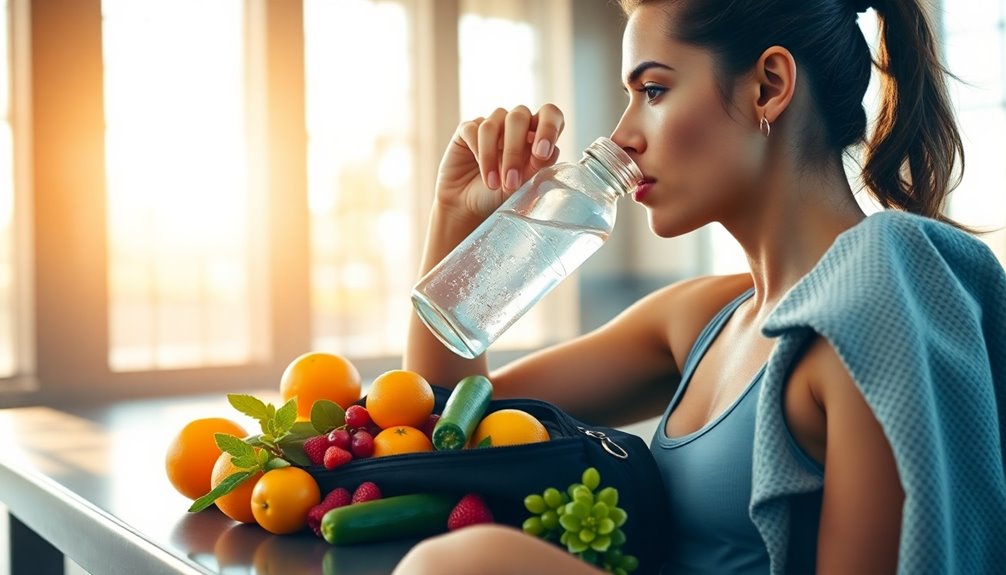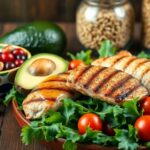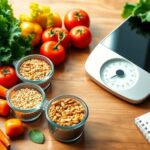To stay hydrated during workouts, start by drinking 16-20 ounces of water about two hours before exercising. During your workout, sip water regularly, aiming for around 8-10 ounces every 20 minutes. Pay attention to your body's signals; if you feel fatigue or cramping, it might signal dehydration. Choose beverages wisely—opt for water or electrolyte drinks while avoiding sugary and caffeinated options. Incorporate hydrating foods into your diet, like fruits and veggies. Don't forget to monitor your fluid intake, so you can adjust based on your sweat rate. There's much more you can explore to enhance your hydration strategy.
Key Takeaways
- Drink 16-20 ounces of water two hours before your workout to enhance performance and hydration.
- Sip an additional 8-10 ounces closer to your workout for optimal hydration.
- Choose electrolyte-rich beverages like sports drinks or coconut water to maintain electrolyte balance during intense workouts.
- Monitor your sweat rate and replenish lost fluids with 16-24 ounces of water per pound lost.
- Take consistent breaks during workouts to sip water regularly and avoid dehydration symptoms.
Understand Your Hydration Needs
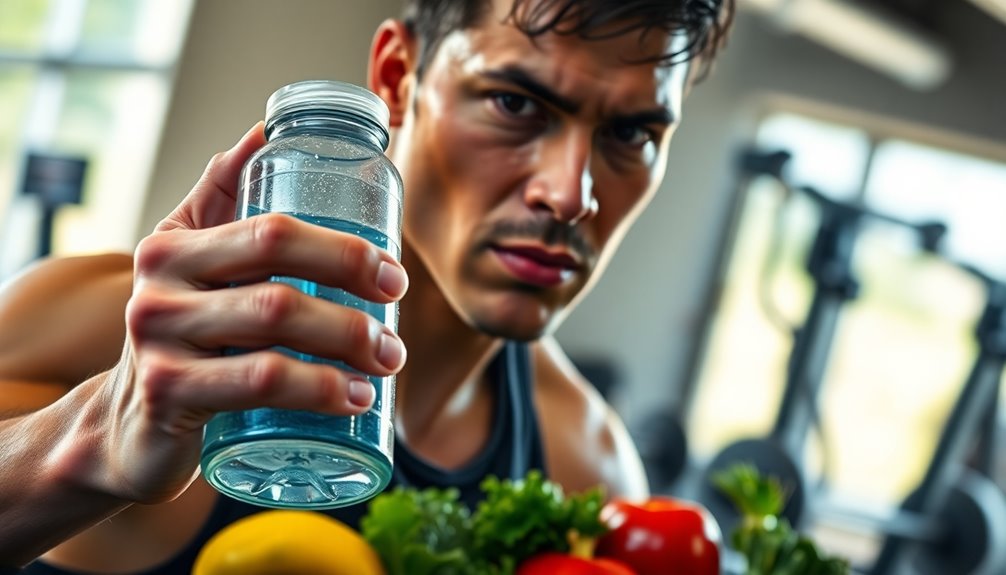
When it comes to staying hydrated during workouts, understanding your hydration needs is vital. Knowing how much water and electrolytes you need can make a significant difference in your performance and overall well-being. Start by considering your sweat rate, which varies from person to person. If you tend to sweat heavily, you'll likely need to replace fluids more frequently. Keeping track of your sweat rate can be as simple as weighing yourself before and after a workout.
For every pound lost, aim to drink approximately 16-24 ounces of water to replenish those lost fluids.
It's also essential to maintain your electrolyte balance. Electrolytes, like sodium, potassium, and magnesium, help regulate fluid balance in your body, and they're lost through sweat. If you're sweating a lot during your workouts, consider incorporating sports drinks or electrolyte tablets into your routine. These can help restore what you've lost and keep your energy levels up.
Listen to your body. If you're feeling fatigued, dizzy, or cramping, it's often a sign that your hydration isn't adequate. Find a hydration strategy that feels right for you, whether that's sipping water consistently or having an electrolyte drink during intense sessions. Additionally, incorporating mini band workouts can enhance your fitness routine while also promoting muscle toning through effective elastic resistance.
The goal is to feel good while working out and to recover effectively afterward. By understanding your hydration needs, you'll not only enhance your performance but also foster a sense of belonging in your fitness community.
Drink Water Before Workouts
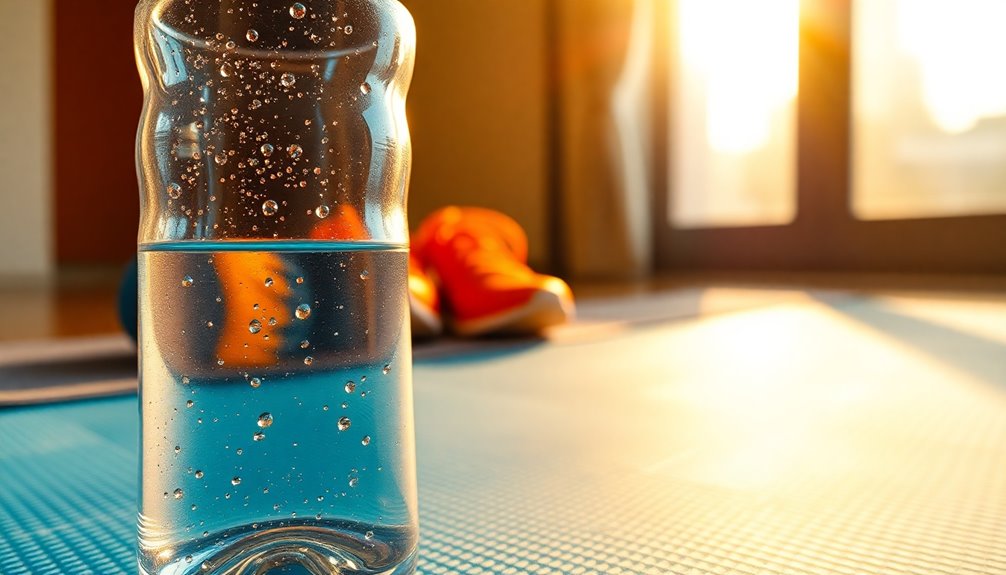
Proper hydration is essential for peak performance, and drinking water before workouts sets the stage for success. When you take the time to hydrate properly before hitting the gym or heading out for a run, you're not just quenching your thirst; you're preparing your body for the challenges ahead. Pre-exercise hydration plays a pivotal role in maintaining your electrolyte balance, which is vital for muscle function and overall endurance.
Aim to drink at least 16-20 ounces of water about two hours before your workout. This gives your body ample time to absorb the fluids and use them effectively.
If you're feeling extra thirsty as you get closer to your workout, sip on another 8-10 ounces about 20-30 minutes prior. This will help guarantee your muscles are primed and ready to perform.
Drinking water before exercise also helps to ward off fatigue. Dehydration can lead to decreased focus and stamina, making it hard to stay motivated. By making hydration a priority, you're setting yourself up for a more enjoyable and effective workout experience.
Don't forget that your body needs more than just water—it also craves electrolytes to keep everything running smoothly. Consider incorporating electrolyte-rich drinks if you're gearing up for an intense session. Additionally, a plant-based diet, rich in antioxidants and fiber, can further support your hydration and overall performance.
Choose the Right Beverages
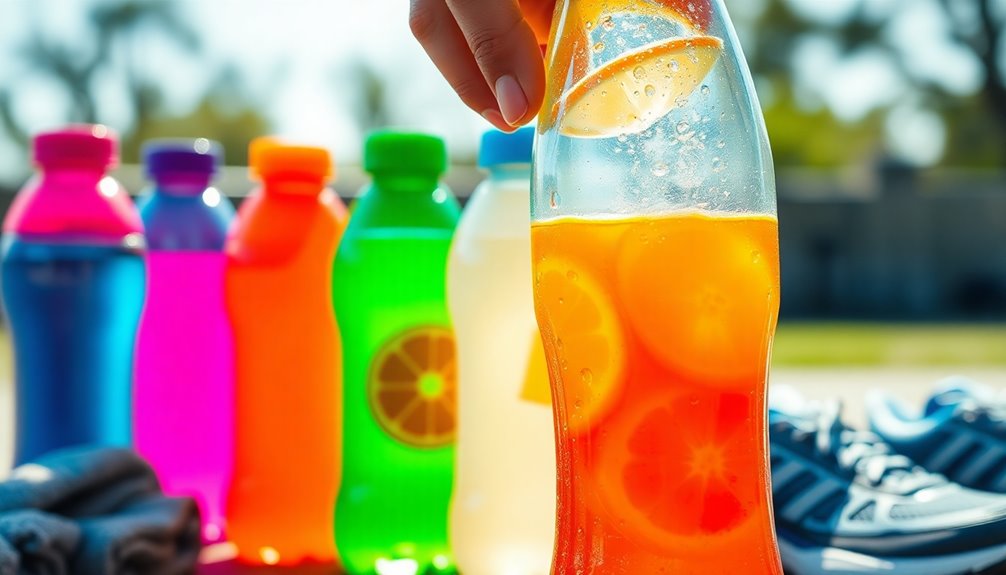
Choosing the right beverages can make a significant difference in your hydration strategy during workouts. You want to fuel your body with fluids that not only quench your thirst but also support your performance. It's vital to look beyond plain water, especially during intense workouts.
Here's a quick comparison of some popular beverage options:
| Beverage Type | Benefits |
|---|---|
| Water | Best for light workouts; keeps you hydrated without added sugars. |
| Sports Drinks | Helps maintain electrolyte balance; ideal for long sessions. |
| Coconut Water | Natural source of electrolytes; invigorating and low in calories. |
| Electrolyte Tablets | Convenient for on-the-go hydration; adaptable to your needs. |
| Herbal Teas | Hydrating and soothing; excellent for post-workout recovery. |
Be mindful of hydration myths that suggest sugary drinks or excessive caffeine are good options. These can lead to dehydration instead of helping your electrolyte balance. While it's tempting to reach for energy drinks, they often contain more sugar and caffeine than beneficial electrolytes.
Instead, opt for beverages that genuinely hydrate and replenish your body. Think about what works best for you, considering your workout intensity and duration. Remember, your hydration needs may vary, so it's vital to listen to your body. Making informed choices about what you drink can enhance your workouts and help you feel more connected to your fitness journey.
Set a Hydration Schedule
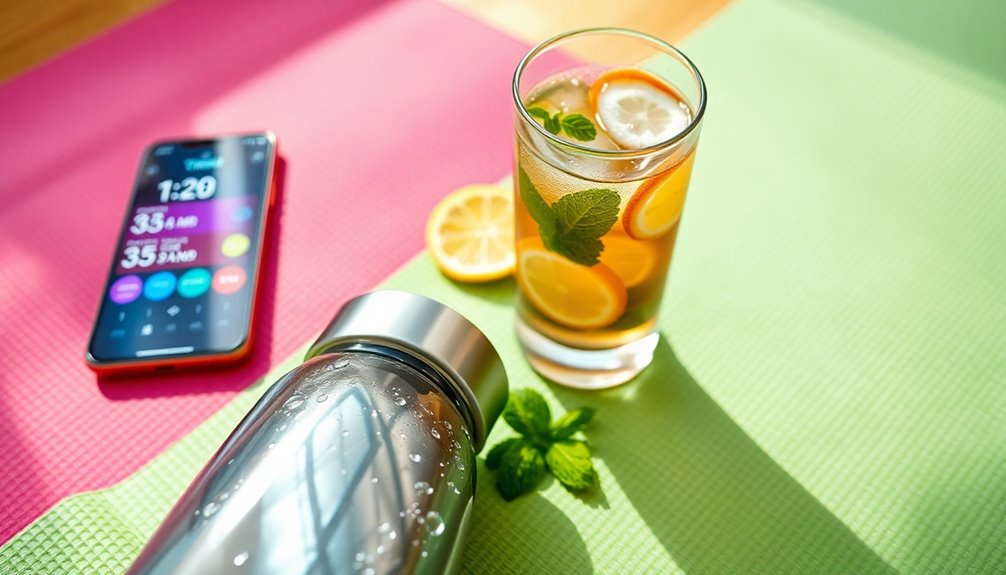
Establishing a hydration schedule can greatly improve your workout performance and recovery. It's all about creating a routine that keeps you consistently hydrated throughout your exercise sessions.
To start, plan to take consistent breaks during your workouts. This allows you to sip on water regularly rather than waiting until you feel thirsty. Thirst can be a sign that you're already dehydrated, so it's best to prevent that.
Using portable bottles makes it easier to stick to your schedule. Find a bottle you enjoy and can easily carry with you, whether you're at the gym or outdoors. Keep it filled and close by to remind yourself to drink. You could even set reminders on your phone or smartwatch to prompt you to hydrate at specific intervals.
Think about filling your bottle before each workout and aiming to finish it by the time you're done. If you're exercising for an hour, consider sipping every 15-20 minutes. This structured approach not only helps you stay hydrated but also establishes a sense of routine that can enhance your overall experience. Additionally, staying hydrated may positively impact your body's ability to manage blood sugar levels, which is crucial for overall health and particularly important for those with diabetes.
Monitor Your Fluid Intake
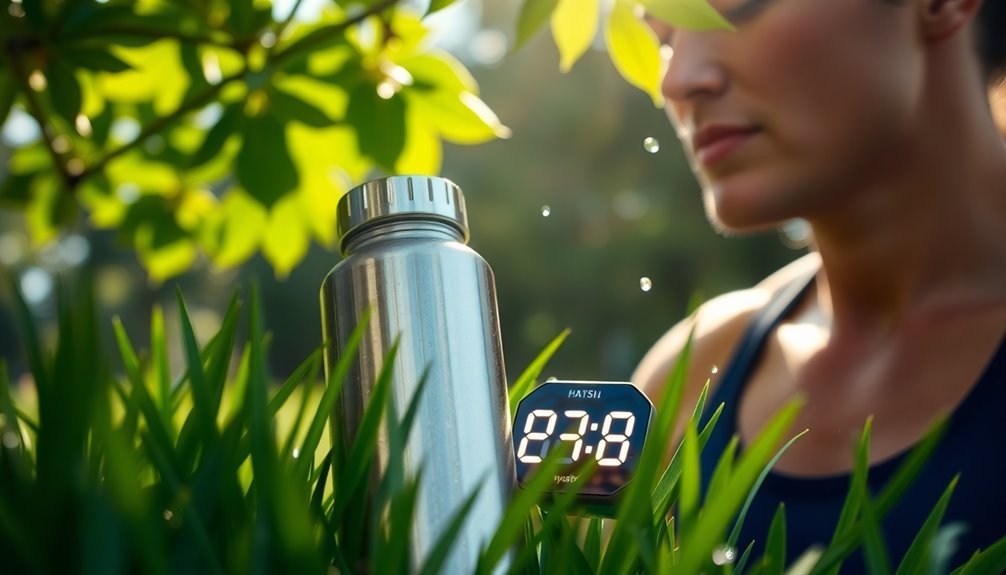
Monitoring your fluid intake is fundamental for optimizing your workout performance and overall health. By keeping an eye on how much you're drinking, you can guarantee that your body stays hydrated and functions at its peak. Start by incorporating hydration tracking into your daily routine. This could be as simple as using a water bottle with measurement markings or a hydration app on your phone. These tools can help you visualize your intake and make adjustments as necessary.
Don't forget about your electrolyte balance, either. When you sweat during workouts, you lose not just water but also essential minerals like sodium, potassium, and magnesium. Keeping these electrolytes in check is vital for maintaining energy levels and preventing muscle cramps. If you're exercising for an extended period, consider adding electrolyte-rich drinks to your routine. These can replenish what you've lost and keep you feeling great throughout your workout.
As you monitor your fluid intake, pay attention to your body's signals. Thirst is a clear indicator, but also look out for signs like fatigue or dizziness. Establishing a habit of regular hydration tracking and being mindful of your electrolyte balance will help you foster a strong sense of community with others who prioritize their fitness journeys. Additionally, adopting a plant-based diet can help improve hydration levels through increased water-rich food consumption.
You're not alone in this; many people are working towards better hydration and performance. By taking these steps, you'll not only enhance your workouts but also contribute to a culture that values health and well-being.
Use Hydration Reminders
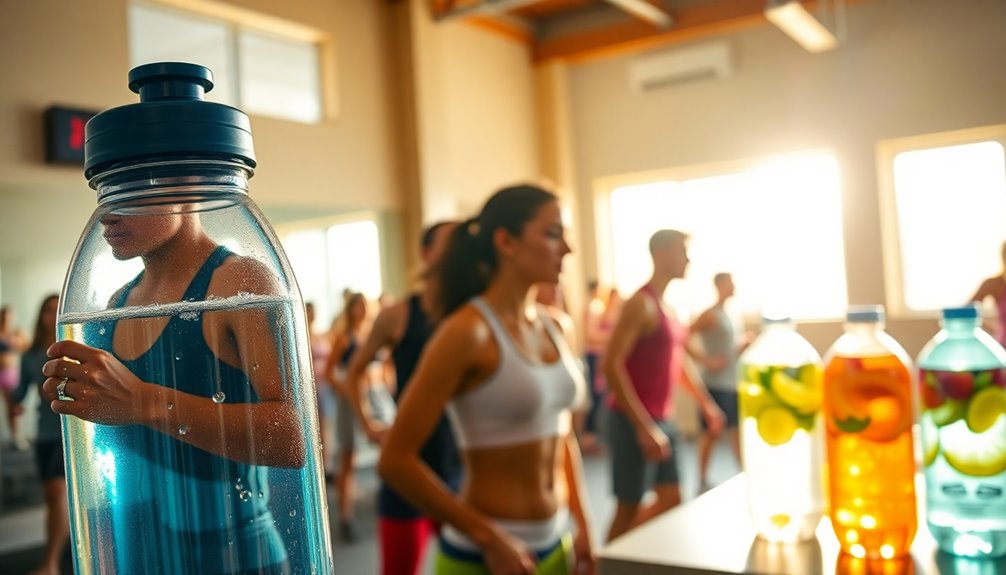
Staying consistently hydrated during workouts can be a challenge, but using hydration reminders can make a significant difference. With our busy lives, it's easy to forget to drink water, especially when you're focusing on your fitness goals. That's where hydration technology comes in handy.
Consider downloading hydration apps that can track your fluid intake and send you reminders throughout your workout. These apps allow you to set personalized hydration goals based on your activity level and even your body weight. They can remind you to take sips during your workout, ensuring you stay on top of your hydration game.
Some apps even integrate with your fitness tracker, providing real-time updates on your hydration status.
You can also leverage smart water bottles equipped with sensors that connect to your phone. These bottles can notify you when it's time to drink, making it easy to stay accountable. It's not just about quenching thirst; it's about fostering a supportive environment where you prioritize your well-being.
Additionally, just like mastering the art of hand sharpening, staying mindful of your hydration can lead to improved performance and results. Join communities or groups that encourage hydration as part of a healthy lifestyle. Sharing tips and experiences with fellow fitness enthusiasts can inspire you to stick to your hydration plan. Remember, you're not alone in this journey. By using hydration reminders, you'll cultivate a habit that not only enhances your workouts but also contributes to your overall health.
Incorporate Hydrating Foods
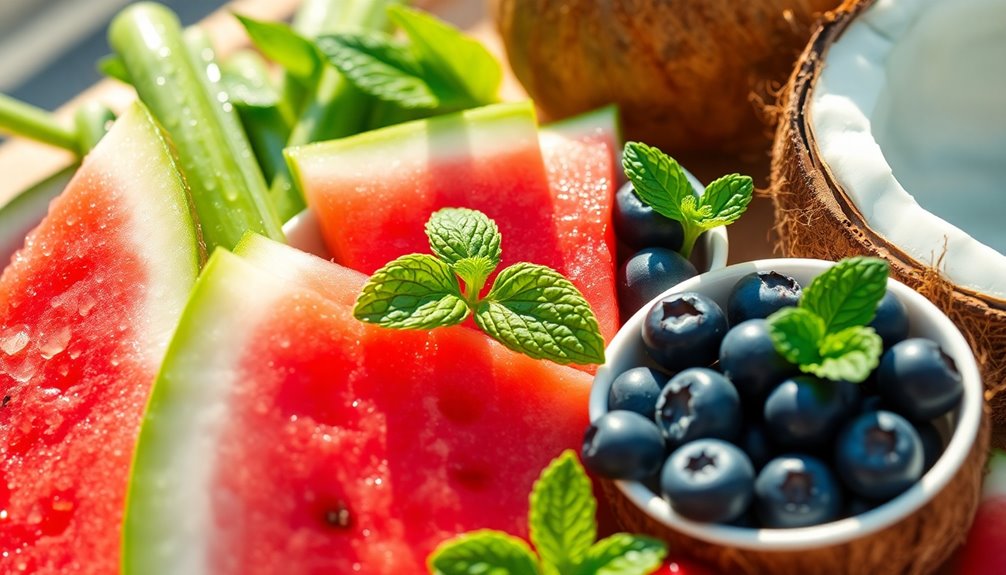
Incorporating hydrating foods into your diet can greatly enhance your hydration levels during workouts. Not only do these foods quench your thirst, but they also provide essential nutrients that support your performance. Think about adding hydration snacks and electrolyte fruits to your pre- and post-workout meals.
Here's a quick list of reinvigorating foods you can easily include:
- Watermelon: This delicious fruit contains about 92% water and is packed with vitamins A and C, making it a fantastic choice for hydration.
- Cucumbers: With a water content of around 96%, cucumbers are one of the most invigorating veggies you can munch on. Slice them up for a revitalizing snack or toss them in your salad.
- Oranges: Not only are oranges juicy and sweet, but they're also rich in electrolytes like potassium, helping to replenish what you lose during sweat sessions. Additionally, maintaining proper hydration is vital for preventing CKD progression, which can be influenced by lifestyle choices.
Adjust for Weather Conditions
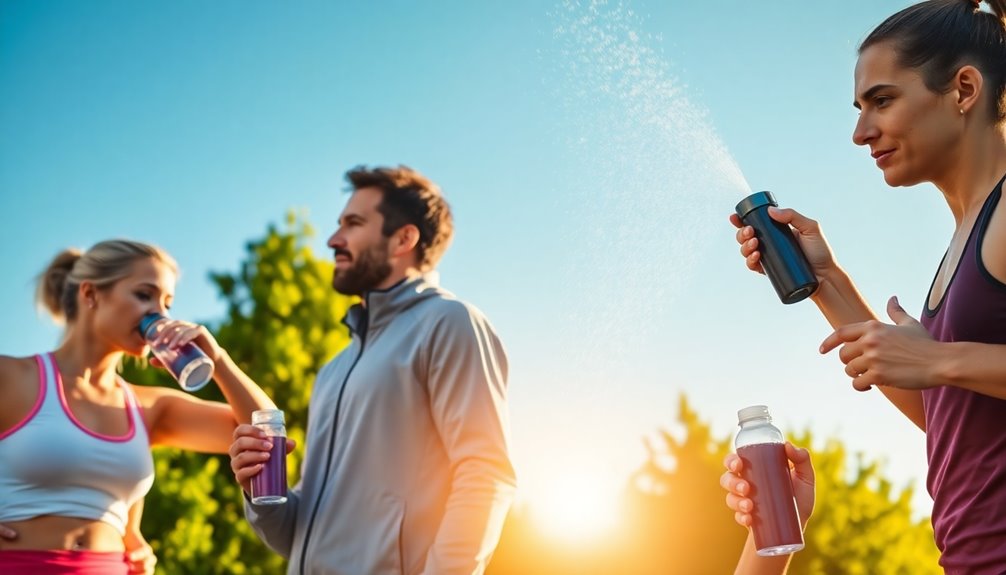
When the temperature rises or the humidity spikes, adjusting your hydration strategy becomes essential for peak performance during workouts. You need to pay close attention to how these weather conditions affect your body's fluid needs. High heat and humidity can lead to increased sweating, which not only depletes water but also disrupts your electrolyte balance. To combat this, consider incorporating electrolytes into your hydration routine, especially if you're exercising for extended periods.
Make sure you've got the right hydration gear on hand, like a water bottle that fits your routine and a hydration pack for longer sessions. This gear makes it easy to sip regularly, ensuring you're not waiting until you're thirsty to drink. Thirst can be a sign that your body is already starting to dehydrate, so aim to stay proactive.
In hot weather, you might need to increase your fluid intake. As a general rule of thumb, drink about 17-20 ounces of water two hours before you start your workout, and then continue to hydrate during your session. If you're sweating heavily or exercising in extreme conditions, consider drinks that replenish electrolytes, such as sports drinks or electrolyte tablets. Research indicates that proper hydration can also enhance metabolism, contributing to better workout performance and recovery.
Don't forget to listen to your body. If you feel fatigued or dizzy, it's a sign that you may need to hydrate more. By adjusting for weather conditions, you'll not only enhance your performance but also foster a sense of belonging in your fitness community as you share tips on staying hydrated with fellow enthusiasts.
Frequently Asked Questions
Can I Rely Solely on Sports Drinks for Hydration?
You can't rely solely on sports drinks for hydration. While they're beneficial during intense activities, water plays an essential role in your overall hydration strategy. Sports drinks contain sugars and electrolytes, which can help replenish lost nutrients, but they shouldn't replace water. Balancing both can enhance your hydration.
How Do I Know if I'm Overhydrating?
You can tell if you're overhydrating by monitoring your hydration levels and how your body feels. If you notice excessive thirst, frequent urination, or swelling, it might be time to cut back.
Keep an eye on your electrolyte balance, too; overhydration can dilute essential electrolytes, leading to symptoms like headaches or nausea. Trust your body's signals and adjust your fluid intake to maintain a healthy balance without going overboard.
What Are the Signs of Dehydration During Workouts?
Imagine your throat feeling parched, each swallow a struggle. If you're experiencing dry mouth, fatigue, dizziness, or dark-colored urine, you're showing symptoms of dehydration. Your body's warning you to take action.
To prevent this, listen to your body, sip water regularly, and keep an eye on how you feel. Staying connected with your hydration needs helps you perform your best and feel like part of the active community you belong to.
Is It Okay to Drink Coffee Before Exercising?
It's totally okay to drink coffee before exercising! Caffeine intake can boost your energy and enhance exercise performance. Just be mindful of your hydration levels; coffee can act as a diuretic, so balance it with water.
Incorporating coffee into your pre-workout routine can help you feel more alert and ready to tackle your workout. Just listen to your body and adjust accordingly to make sure you're performing at your best!
How Much Water Should I Drink After a Workout?
After a workout, aim to drink about 16 to 24 ounces of water for every pound lost during exercise. This helps restore your hydration levels and maintains your electrolyte balance.
Don't forget to hydrate within 30 minutes post-workout for best hydration timing. It's all about replenishing what you've lost, so listen to your body and stay connected with how you feel.
Staying hydrated keeps you energized and ready for your next challenge!
Conclusion
Staying hydrated during workouts is essential for your performance and well-being. Did you know that even a 2% drop in your body's fluid levels can lead to a 10% decrease in exercise performance? By understanding your hydration needs, drinking water before your workouts, and incorporating hydrating foods, you can keep your body fueled and energized. Remember to set a hydration schedule and listen to your body—your workout results will thank you! Stay proactive about hydration, and you'll feel the difference.

